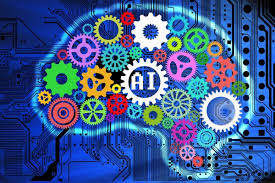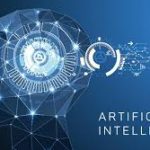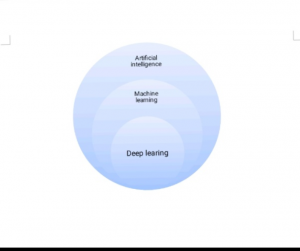
artificial intelligence
Artificial Intelligence: Emer ging of Artificial human
ging of Artificial human
Article by:-Priyatam bhardwaj
Artificial intelligence (herein after referred as “AI”) is made up of two terms, artificial which means something which is not real i.e. is man-made and intelligence means “capacity of mind to learn or understand and apply the learning. AI is the innovative use of technology to create a robotic stimulation of human intelligence. We have witness astonishing and unimaginable advancement of technology in recent years. Artificial intelligence is already regarded as most remarkable innovation of 21st century. The term artificial intelligence was first used by an American computer scientist John McCarthy who is praised as father of artificial intelligence. The Objective behind the emergence of artificial intelligence was the need of automation of several processes practiced by human labour. The Very question that is proposed by McCharthy was “whether machine can learn and think like general human”. The central feature of AI is the capability of machine to learn and process it and then apply the same.
In India, this AI technology is still in its very nascent phase and computer scientists are constantly striving to implant into or improve the cognitive abilities to or of the machine. Thus, AI is the future and I believe no country would like to lag behind in this upcoming sector. Even, Bill gates who is founder of Microsoft said, “this is the right start investing in AI and I would have working in this sector i was to start new start-up”. Countries like US, France, China, India, Australia etc has already Unrevealed their roadmap and strategic action plan towards development in this sector. NASSCOM in its report has said no one can afford to risk the delay or ignore the development of this sector within their country and beside it has predicted that approximately 46% of job will transformed which will require entirely and separately different sets of skills and ability .
Artificial Intelligence, Machine learning and deep learning
All three are different concepts more like sub-sets to each other. However, people often get confused with them think they are one and the same thing. They are differentiable in context of method of their operation.Machine learning basically sub-divide the process and then execute the task by adopting to piecemeal approach whereas deep learning execute the task as a whole in entirety. Deep learning is advancement of machine learning. Examples of Machine learning is recommendation made to customer by amazon regarding what else product they might want to purchase. It processes the data made available to them and then make perception i.e. make recommendation to their customer. Other examples of this concept are, friends suggestion on facebook, or next movie you may like to watch on Netflix etc. Now, What is deep learning is where machine itself collect the data and discharge the function. Example of this may be face recognition locks on mobile phone. It collect the basic features of a face as data and store it and unlock when a face with similar minute and basic features come in front of it. Other examples can be finger sensor and camera sensor etc.
Limitations to Application of AIs
Possible negative outcomes of this AI advancement can be of varied nature. Social negative impact covers the people may become heavily and acutely dependent upon such robotic functions and will slowly wane off their natural skills function those type of activities like people are forget to the skill to handwriting gradually because they are more used to typing now. We may also hold it liable for causing laziness among people. People may shift all the physical work to the machine. Never the less, many work which is labelled as low grade or below ones standard will made done by those AI developed robots. Thus, these are some natural and expect negative implication upon society. These works may include washroom cleaning, sweeping, sewage cleaning, waiter jobs etc. It will also cause unemployment. Though it has been said it will create different type of job but the number of job it will create is relatively very low in compare to the number of jobs it may destroy.

Working model of AIs
AIs are said to operate in similar way as natural human mind functions. We human acquire the knowledge through learning and experiencing and then form decision or perception. Eg. We first experience what is bitter or sour taste is then we able to tell whether a food is bitter in taste or not. People live their life based upon knowledge and awareness and what they understand as correct and true. Similarly robots learning that is it collect data from environment through sensor and form decision. Example is self-driving car, it identify the object in surrounding through sensor and navigate it way ahead to its destination. Though we are yet to witness self-driving car in India but we see the voice recognition ability in google speaks Application, face and person identifying ability of machine via automatic rotating cameras. We are already witnessing AI enabled technologic application like Siri and Alexa of Apple phone and amazon respectively.
Government approach and Regulations
Currently there is no rule nor any guidelines issued by government related to AIs. Indian companies seems to have invested heavily in AI sector and even government is encouraging investment in this sector. Almost all the major powerful countries are found to be investing heavily in advancement of Artificial intelligence and so does India.
On Auguest 24, 2017, a task force was constituted by Ministry of Industry and commerce which consist of scholars, Industry representative and representative of various ministries like NITI Ayog, Ministry of electronic and information technology, department of science and technology,Unique Identification Authority of India and DRDO. They submitted a report which look at the scope of application of AI along with it major challenges and possible solutions for each sector. It examined ten sector referred as “domain of relevance to India” These sectors were: Manufacturing, FinTech, Agriculture, Healthcare, Technology for the Differently-abled, National Security, Environment, Public Utility Services, Retail and Customer Relationship, and Education. The task force made following recommendations: (a) the creation of an inter- ministerial National AI mission to coordinate AI-related activities in India; (b) enabling the setting up of digital data banks, marketplaces and exchanges to ensure availability of cross-industry data and information; (c) participating in the elaboration of operation standards for AI-based systems; (d) putting in place enabling policies to encourage and facilitate the development and deployment of AI-based products (such as data policies regarding ownership, sharing rights and usage, as well as tax incentives to support innovation); (e) elaborating an AI education strategy to develop human resources with necessary skills; (f) supporting reskilling of the current workforce; (g) participating in the international policy discussion on the governance of AI technologies; and (h) leveraging bilateral partnership on the development of AI solutions for social and economic problems and for sharing best practices in regulation.
On February 1, 2018,late Finance Minister Arun Jaitley stated that the NITI Aayog would lead the national programme on AI and he further showed the government’s willingness to support startups and centres of excellence with respect to AI training and research activities.
On June 4,2018, Niti ayoug publish a discussion paper on National strategy on Artificial Intelligence. It focus in its entirety on social development through introduction of AIs. These sectors include healthcare, education, smartcity/infrastructure, agriculture, transportation.
Ministry of Electronic and Information has established four committees to help encourage and boost research in AI. These committees consist of eminent scholars of IITs, NASSACOM and renowned researchers. These committees are “presently studying AI in context of citizen centric services; data platforms; skilling, reskilling and R&D; and legal, regulatory and cybersecurity perspectives.
Government of India is heavily laying emphasis on introduction of AI in defence sector and is determined to introduce AI based technology for defence sector very soon.
Potential challenges accompanied with AI
Privacy Infringement: The technological development like AI pose unprecedented quantum of challenge to privacy, freedom of speech and expression. There is no comprehensive legal framework for data protection. Technological practice which uses personal information pose deep threat on Individual privacy as it collect data from variety of sources including third party and can generate new information through creation via collection and can use data insight for a multiple purposes including those which are still to comprehend and besides these Technological entities can easily retain these sensitive data for a very long period of time without any difficulties.
In july 2018, BN srikrishna committee, submitted its draft on protection of personal data bill along with a report. According to an analysis by the Centre for Internet and Society, “the Bill creates a framework to address harms arising out of AI, but does not empower the individual to decide how their data is processed and remains silent on the issue of ‘black box’ algorithms” and is “focused on placing the responsibility on companies to prevent harm.” The report raise the question upon the procedure adopted by automated AI based algorithms and seeks to grant the people right to object the application of such method and a right to access the logic behind it. The report questions the accuracy of task performed by these algorithm based technical machines. It suggested that the functions discharged by these machines must be review by an human regularly to align its accuracy and also these machine themselves must be reviewed by technical staff upon regular interval to avoid any unjust contraventions or go amiss from accurate functioning.
Government is working with private sector to deploy facial recognition AI camera across the streets to detect and prevent crimes. And such recording are admissible in court as evidence under section 65B of evidence Act.
Elon Musk the founder of Tesla car which is known for its driver less car, said AI pose risk to human civilization. Uncontrolled AI may endanger the human existence. It may sound more like what happen in fiction Hollywood films terminator or Bollywood film robot but this same question will definitely strike in whenever we attempt to consider the potential dangers pose by AI. As stated by SN srikrishna committee, like in any other machine, even AI based machine can be manufactured with some defects which in turn, can cause operational complications.
Apparently government seek to stimulate the economy. Government need ensure the accurate functioning of these AI based machines by indemnifying the customer from the potential damages occurring due to technical defects through curating a regulated conducive environment for these AI based application or machine. The government need to draft a policy to serve two fold purpose that to derive innovation and alongside build public and consumer trust.
Well researched and a very informative read!
Great work by the author in compiling all this info.
Thnx for appreciation sir!!!
This is an excellent article. Well researched and well written.
Thanks sir for your kind appreciation!!
This was a really long article but I must say that it was quite informative and the author has really research very well and deeply about the topic. I would also like to mention that the writing skills of the author are really good.
Very knowledgeable and useful!
Very knowledgeable article